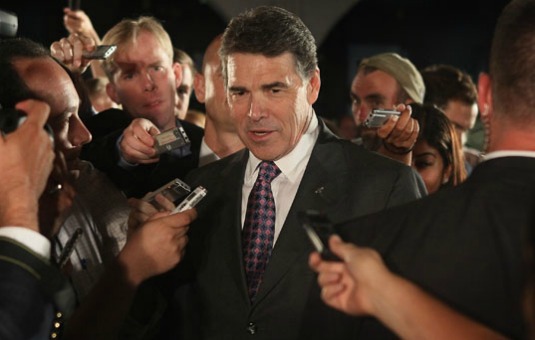Perry: Media Bubble Boy

Texas Governor Rick Perry has had a tough week politically because of his weak performance at the last GOP presidential debate. He's had to backtrack from comments he made and his standing in the polls has taken a hit. There's been a lot of commentary regarding why Perry hasn't done as well as he and his supporters have hoped.
While there are many factors underlying this issue, I'd suggest one reason for Perry's lackluster performance is because he hasn't faced direct, sharp questioning for much of his political career and he's functioned in something of a bubble for quite some time. Right now, his policies and background are being scrutinized to a degree he isn't accustomed to.
Perry hasn't had to face harsh press scrutiny before for several reasons, some of which have nothing to do with him. For one thing, there isn't a longstanding statewide watchdog press organization in Texas that a Governor cannot avoid. em>Texas Monthly< and the em>Texas Tribune< are the two biggest statewide news agencies in Texas.
Both are fine news sources, but Texas Monthly is as much a monthly lifestyle magazine as it is a news magazine and its political journalism is known more for process and personality stories than for investigative journalism. The Texas Tribune does a better job on that score, but it is a very new player to Texas media so it hasn't been around for most of Perry's career. The venerable em>Texas Observer< certainly produces sharp, provocative journalism, but its leftist reputation allows it to be easily ignored by Republican officeholders and many mainstream journalists (which is a shame).
By and large, there isn't a lot of harsh questioning from local media outlets, because the local press tends to want access to politicians and will avoid risking that access. Plus, Texas is such a large state that even if one local newspaper or television station decided to really go after a politician, that story would probably remain local. (Admittedly, this is less true in the internet age.) All of this would create a bubble around any Governor of Texas, but it's worse with Perry because of longevity and the one-party statewide rule of the GOP since the mid-nineties.
Also, there's also the Austin factor. Those of us who live in Texas outside of Austin often notice that Austin itself is a bubble, both for liberals and conservatives who live and work there. The culture of the capital city is insular and there's a lot of ideological and personal cocooning there, more so than in many other cities, and that can create a cliquish bubble environment. It's not uncommon for people who visit Austin from other Texas cities to say that visiting there was like going back to college, and that's not always said as a compliment.
So in some ways, the Rick Perry bubble story is also a story of the Austin bubble. He doesn't have a reputation for surrounding himself with people who will challenge his views or engage with new ideas and the general culture of the city he's in doesn't help on that score.(And to be fair, that isn't a problem in Austin that's limited to Republicans.)
It's still far too early to count Rick Perry out of the GOP presidential race. While the air of invulnerability he had for a few weeks is gone, he still is a formidable candidate. But he would have been a more formidable candidate if he had more experience in defending his views and facing counter arguments and sharp questions. The reasons why he hasn't had that experience aren't limited to him, but the end results are being faced by him right now.

